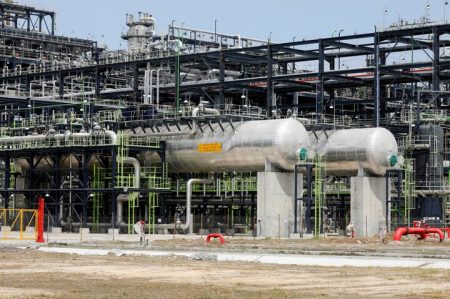
Kunle Kalejaye
01 December 2016, Sweetcrude, Lagos — The Executive Secretary of Nigerian Content Development and Monitoring Board, NCDMB Engr. Simbi Kesiye Wabote has described NigerDock, a wholly indigenous Nigerian energy services company as the success story of local content policies implementation in the country.
Wabote stated this when he, top management of the board and representatives of International Oil Companies, IOCs paid a courtesy visit to the company’s facility at Snake Island Integrated Free Zone in Lagos.
“NigerDock is an example of some of the local content policies we have adopted. In the past, I’m sure none of you visited this yard but while I was speaking to the chairman of the group, he told me that before they came here, they had twenty drivers and two cars, and those two cars were not working but today we went round and saw the impact of local content on this facility,” he said.
He commended the chairman of NigerDock Anwar Jarmakani for keeping fate with Nigeria and providing employment for more than 100, 000 household despite the economic challenges in the country promising that NCDMB will work closely with the company.
“Despite the economic challenges in the country, the company is still keeping fate. I am overly impressed,” he said.
Wabote added: “It is my first time of visiting the island. I decided to visit and see what the company is doing. With me here are top management of the board and representatives of IOCs except for Exxon Mobil. This visit will give them the opportunity to talk about what they’ve seen.”
The Executive Secretary of the NCDMB explained that operators in the Nigerian oil and gas industry have increased their compliance level from less than three percent when the NCDBM Act was enacted in 2010 to 30 percent in 2016.
“Before 2010, the local content attainment was about three percent because the country focused more on the revenue they get from selling oil and the tax they get out of that revenue, but with the advent of local content, we felt all the money that was left on the table, we needed to retain some of it in-country hence the push to carry out most of those activities that hitherto were exported out of the country to happen here,” he said.
He attributed the current increased drive for project design in-country to the enforcement of the local content law. From front-end to detailed engineering design, he said operators have brought back design to Nigeria.
This initiative according to him has led to the establishment of a lot of design companies to deliver value to the sector and enable the IOCs to set up their own design team within the country.
“In terms of service, a lot has improved and today we have moved the needle to about 30 percent but we are not there yet,” he admitted, stressing that local content development is not a sprint, but a marathon, and will require an improved skill-set and investments to achieve greater success.



